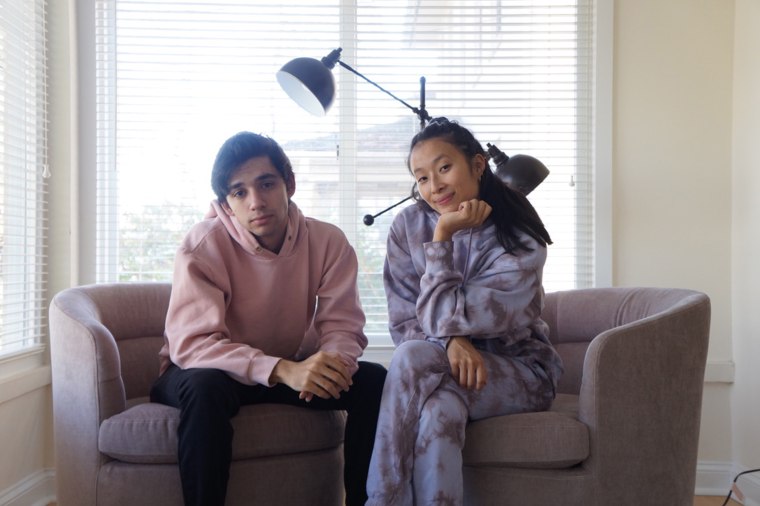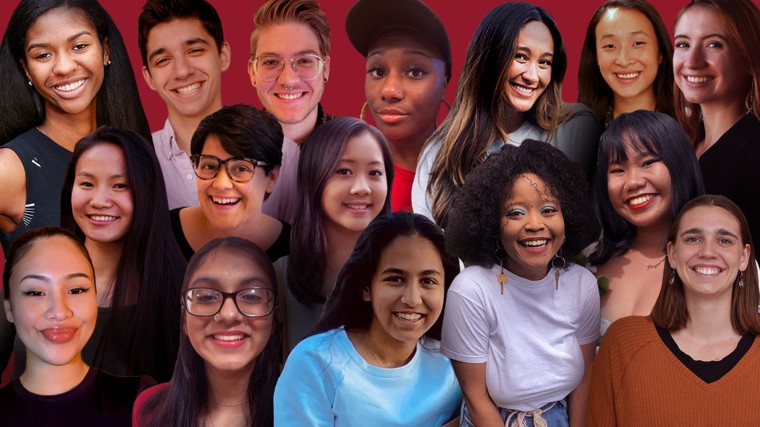Recently Nick Jain, a 21-year-old senior at Princeton University, purchased dozens of boxes of tampons — every brand he could find — brought them home, spread the contents out on the kitchen counter and began to take them all apart.
"I wanted to figure out the subtle differences in the way they opened, whether it was in a spiral form or a cylinder form, the type of applicator that was used and the sharpness of the curve as it approached the insertion point, all these small features," Jain told TMRW. "Also, how these products are put together — some are just two pieces of cotton folded, and a string."
It was all part of his research for the direct-to-consumer period brand he and co-founder Nadya Okamoto launched this week, called August. They haven't launched products just yet, but plan to in Spring 2021. For now, August is a growing online community aiming to "re-imagine and redefine the period experience to be powerful and dignified," with members who engage in conversations about how to properly use menstrual cups or what it's like to be a transgender man having a period, for example.
Jain is the founder of JUV Consulting, a Generation Z marketing firm that helps companies target young consumers. So picking apart products and their messaging is in his wheelhouse. But growing up in New Jersey, Jain was like most other boys in thinking that talking about periods was an icky, uncomfortable topic he'd rather avoid.
"I remember when my sister got her period, noticing there were tampons and pads in the trash can in the bathroom," he said. "It was something we didn't talk about. I think the first conversation I had with my mom about periods was when I told her I was starting this company. I saw the look on her face; she looked very taken aback."
His interest in the period space began in 2018, when he heard Okamato speak on a panel they were both on about period poverty, including how many women can't afford period products and resort to unsafe ways to stop the bleeding, and the tampon tax, a state tax imposed on menstrual hygiene products.

"I was almost shocked that I knew so little about this," he said. "I started realizing a lot of the injustices that exist around something as natural as menstruation."
Jain and Okamoto have a lot in common: They both launched companies at age 16 and they're both Ivy Leaguers. Now they're best friends who even live together in Princeton. (Okamoto attends Harvard University virtually.)
Okamoto, 22, has been one of the best-known activists of the menstrual equity movement for years, ever since she launched Period, an organization aimed at ending period poverty and stigma around periods, at age 16. But her fast rise to fame at a young age came to a halt earlier this year, when other activists accused her of "performative activism" and silencing her peers, particularly people of color.
Okamoto had already stepped back as executive director and taken on an advising role, but this summer, Period terminated its contract with her entirely. In a statement on its Instagram page, it urged followers to give her "room to make mistakes, learn and grow from them."
As Okamoto tells it, she was so laser-focused on growing the menstrual movement — through her book, "Period Power: A Manifesto for the Menstrual Movement," multiple high-profile media interviews, landing on Forbes' 30 Under 30 list as well as others — that, amid the whirlwind, she did not realize she was "monopolizing" the movement.
Months later, after lots of "learning and healing," she's nervous about how some people in the period space will respond to her new project, saying she doesn't expect to have everyone's trust right away.
"I know that this is going to be something that I really have to earn, but I also completely understand if that doesn't eventually happen," Okamoto said.
In a way, August is her comeback. But she's far from the face of the brand. Okamoto and Jain repeatedly stress that while August is a for-profit company, it's centered around community. For example, when products launch next year, they'll be done so with help from their own members. The goal is to make period products people will actually like.
Their research highlighted that most people have no connection to any one period product brand, and that virtually no one says they have a "perfect" experience when it comes to their period. Okamoto and Jain hope to change that, in part by changing the marketing around periods. They pointed out how commercials for tampons and pads use blue liquid to signify blood and how often the word period is avoided entirely, replaced instead with euphemisms.
"The messaging is often centered around shame," Jain said. "It's all about hiding your period or forgetting your period. I'm a big believer that it's a responsibility of brands to reject negative stigmas and I don't think any period brand has done that yet."
They're pushing a cultural shift that allows people to find freedom in being "real" about what it's like to have a period, which makes room for other issues, such as the bodily shame associated with bleeding, the lack of inclusion related to gender, and knowledge about medical problems such as uterine fibroids or endometriosis.
"Since I first got my period, no one had to tell me this small thing of cotton would be a source of shame," Okamoto said. "I knew as a young person to sneak my tampon up my sleeve, or in the store, to hide the box in my bag."
"(We are) taking the attitude of no, period isn't a bad word," she added. "There's nothing wrong with having heavy bleeding — we need to talk about it. What are all the other elements of period health that are underneath the stigma, begging to be talked about?"
To Jain, the fact that he doesn't actually get a period doesn't really matter. In fact, he thinks real change can only happen if and when other non-bleeders care about periods.
"The fact that I don't menstruate doesn't give me the right to not want to change things," he said.
"It's something I wish I would have thought about 10 years ago," he added. "I hope that through normalizing conversations about periods, the next me, as an 11-year-old boy growing up in this country, won't think periods are this gross thing they can't talk or think about, so these stigmas and systemic issues gradually start to deteriorate."

